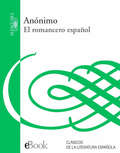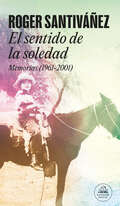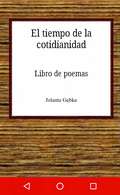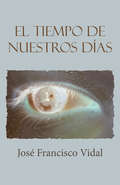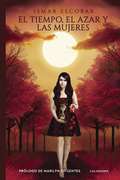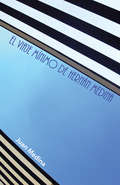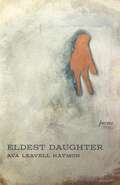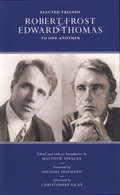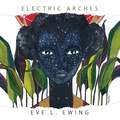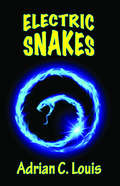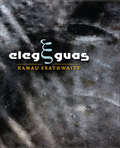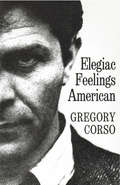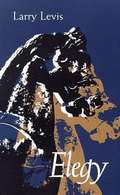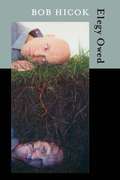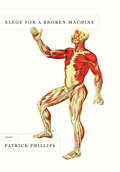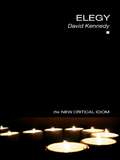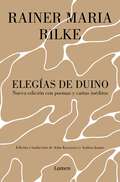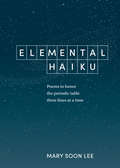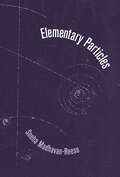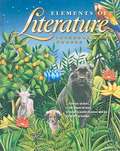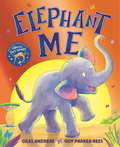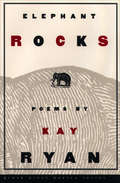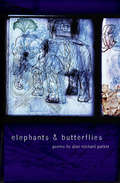- Table View
- List View
El romancero español
by AnónimoLos romances más viejos que conocemos datan del siglo XV, aunque a menudo cuentan epopeyas de los siglos anteriores. Son poemas cortos épico-líricos que se cantaban acompañados de música. Los juglares los sacaron de la corte y los hicieron llegar al pueblo, que los modificó a su gusto y repitió en lenguaje llano. Ensalzaban figuras nacionales como Bernardo del Capio peleando por la libertad de su padre, recordaban gestas carolingias, o informaban de hechos que interesaba propagar como la conquista de Granada.
El sentido de la soledad: Memorias (1961-2001)
by Roger Santiváñez"El asunto era muy sencillo: mi siguiente paso era la tumba. Y no: yo quería escribir, seguir escribiendo y, obviamente, para escribir debía mantenerme vivo".
El tiempo de la cotidianidad
by Jolanta GębkaLibro de poemas rozpoznaje loargo de los años 1995-2017. Son obras poéticas de carácter satírico.
El tiempo de nuestros días
by José Francisco VidalPoemas de toda una vida. De vez en cuando las musas hacen un aquelarre en mi cabeza. El resultado son los versos de este poemario. <P><P>Desde muy joven he sentido la necesidad de escribir como forma de exteriorizar mis sentimientos y sensaciones. Así empezó este poemario, que, a la postre, he dado en llamar El tiempo de nuestros días ya que describe el paso del tiempo en mi vida. <P><P>Como subtítulo Cocinando palabras, como mi blog de poesía, por mi afición, posterior, a la cocina. Se ha ido completando a lo largo de toda una vida, y gracias a las mujeres que la han compartido. Son poemas de toda una vida.
El tiempo, el azar y las mujeres
by Ismar EscobarDespués y hoy, solo será lo imposible empezado a realizarse, sin ataduras ni esclavitud, seamos libres para amarnos, amor mío, para amarnos, sin principios ni finales, solos, con la voracidad de amarnos. El tiempo, el azar y las mujeres no es una manera de mostrar el espejo de lo incomprensible. <P><P>Se abre paso por la vida de todos. En él habitan historias que cobran identidad entre sus páginas. Escribir es una forma de liberar y ser libre. Es dejar de ser uno para convertirse en todos. Este libro de poemas es solo un viaje a través del tiempo, el azar y las mujeres.
El viaje mínimo de Hernán Medina
by Juan Medina¿Poesía de autoayuda? ¿Relato de mis días contigo? ¿Cuaderno de viajes de tu mano? Poemas para cuando explores el mundo. Sus dilemas, sus euforias, su intemperie. Porque existir es delicado. Pero tú decides. Aunque no lo creas. Estás vivo. Nada menos. No es fácil. Pon atención. A ti. Aquí. Ahora.
Elan Vital: A Chapbook of Oriental Poetry and Sumi-e Painting
by Mary E. Rodning Charles B. RodningWith the creation of the Oriental poetry and sumi-e paintings within this volume, the artist and author have attempted to convey their interpretation of the variety, beauty, and novelty of nature and human endeavor. The artist and author would argue that the puissance of their work lies not only in what is explicitly conveyed, but what is implicit as a consequence of interpretation and extrapolation by the viewer. The latter must be receptive and interactive to achieve enlightenment and self-actualization. It would be our hope that through this work, the viewer also would become one with nature, as exemplified by the Japanese term kensho ("contemplation," or to "turn a Zen light on things"), as part of the process of their personal development toward complete insight and enlightenment. We wish for the viewer enrichment and ennoblement. The conveyance of this wish and the creation of this chapbook are our karma.
Eldest Daughter: Poems
by Ava Leavell HaymonIn Eldest Daughter, Ava Leavell Haymon displays her mastery of the craft and engages us with the poetic gifts we have come to expect from her. As in previous collections, she combines the sensory and the spiritual in wild verbal fireworks. Concrete descriptions of a woman's life in the mid-twentieth-century American South mix with wider concerns about family lies and truths, and a culture that supports or forbids clear speech.In a passage from "The Holy Ghost Attends Vacation Bible School," the physical world of children interplays with the divine: The least likely place the Holy Ghost ever descendedwas in east Mississippi. Red clay hillsand church politics soured on years of inbreeding.Every deacon drove a pickup. At Bible School,the kids played red rover and rolled downthe sharp slope behind the Baptist church.He recognized the dizziness at the bottomand the fear of having your name called,but the grass stains, the torn blouses,and sprained wrists -- these were beyond Him.Haymon's poems encourage us to revel in the natural world and enjoy its delights, as well as to confront the difficult realities that keep us from doing so.
Elected Friends
by Michael Hoffman Christopher Ricks Matthew SpencerRobert Frost and Edward Thomas met in a bookshop in London in 1913. During the next four years, the two writers--Frost, an unknown poet who had sold his farm in New Hampshire in order to take his family to England for one last gamble on poetry and Thomas, a sad literary journalist--formed the most important friendship between poets since that of Wordsworth and Coleridge. Their friendship only ended with Thomas' death in Arras, France, a casualty of the First World War. The story of Edward Thomas' turn to poetry, in fact, has been dominated by the account of Robert Frost's injunction: to break his existing prose into lines, bringing his musical cadence and his direct speaking voice into conversation with formal prosody. Thomas himself had already championed Frost's own early work: These poems are revolutionary because they lack the exaggeration of rhetoric.... Their language is free from the poetical words and forms that are the chief material of the secondary poets. The metre avoids not only old fashioned pomp and sweetness, but the later fashion also of discord and fuss. In fact the medium is common speech.... Mr. Frost has, in fact, gone back, as Whitman and as Wordsworth went back, through the paraphernalia of poetry into poetry once again.This book presents for the first time the full record, arranged chronologically, of what the poets wrote to, for, and about one another--their letters, poems, and Thomas' review of Frost's first two books. They reveal a warmth and charm that give us the key to the relationship between Frost and Thomas.
Electric Arches
by Eve L. EwingElectric Arches is an imaginative exploration of Black girlhood and womanhood through poetry, visual art, and narrative prose. <p><p> Blending stark realism with the surreal and fantastic, Eve L. Ewing's narrative takes us from the streets of 1990s Chicago to an unspecified future, deftly navigating the boundaries of space, time, and reality. Ewing imagines familiar figures in magical circumstances--blues legend Koko Taylor is a tall-tale hero; LeBron James travels through time and encounters his teenage self. She identifies everyday objects--hair moisturizer, a spiral notebook--as precious icons. <p> Her visual art is spare, playful, and poignant--a cereal box decoder ring that allows the wearer to understand what Black girls are saying; a teacher's angry, subversive message scrawled on the chalkboard. Electric Arches invites fresh conversations about race, gender, the city, identity, and the joy and pain of growing up.
Electric Snakes
by Adrian C. Louis"In ELECTRIC SNAKES, Adrian C. Louis's thirteenth poetry collection, no one is spared his critical eye, including himself. These powerful and often humorous poems cover myriad subjects: Trump, music, zombies, Jimmy John's, childhood, caller ID, venetian blinds, magpies, love, and Mom."—From the Editor
Elegguas (The Driftless Series)
by Kamau BrathwaiteKamau Brathwaite is a major Caribbean poet of his generation and one of the major world poets of the second half of the twentieth century. Elegguas—a play on "elegy" and "Eleggua," the Yoruba deity of the threshold, doorway, and crossroad—is a collection of poems for the departed. Modernist and post-modernist in inspiration, Elegguas draws together traditions of speaking with the dead, from Rilke's Duino Elegies to the Jamaican kumina practice of bringing down spirits of the dead to briefly inhabit the bodies of the faithful, so that the ancestors may provide spiritual assistance and advice to those here on earth. The book is also profoundly political, including elegies for assassinated revolutionaries like in the masterful "Poem for Walter Rodney."Throughout his poetry, Brathwaite foregrounds "nation-language," that difference in syntax, in rhythm, and timbre that is most closely allied to the African experience in the Caribbean, using the computer to explore the graphic rendition of nuances of language. Brathwaite experiments using his own Sycorax fonts, as well as deliberate misspellings ("calibanisms") and deviations in punctuation. But this is never simple surface aesthetic, rather an expression of the turbulence (in history, in dream) depicted in the poems. This collection is a stunning follow-up to Brathwaite's Born to Slow Horses (Wesleyan, 2005), winner of the Griffin International Poetry Prize.
Elegiac Feelings American: Poetry
by Gregory CorsoA collection of poems by the renowned Beat poet, Gregory Corso. Gregory Corso's collection of poems contains works of major proportions. The title poem is a tribute to Jack Kerouac, fusing a memorial to the poet's dead friend with a bitter lament for the present state of America. The second major work, "The Geometric Poem," published previously in a limited edition by Fernanda Pivano in Italy, is a complex visionary restatement of themes from ancient Egyptian religion. Reproduced in facsimile from Corso's handwritten sheets, his marginal decorations, drawings and glyphs are included. The balance of the book is drawn from his shorter poems. Corso's reputation as a leading poet and co-founder of the Beat movement is clearly upheld in these poems. His instinct for integrated lyrical statement, his special contribution to Beat poetry, is as strong as ever; his sense of humor and sexuality have not diminished. But he has added a wider-ranging moral urgency and a new depth of humane solicitude that hold even his strangest visions close to the heart of contemporary feeling.
Elegy
by Larry LevisA few days before his death in 1996, Larry Levis mentioned to his friend and former instructor Philip Levine that he had "an all-but-completed manuscript" of poems. Levine had years earlier recognized Levis as "the most gifted and determined young poet I have ever had the good fortune to have in one of my classes"; after Levis's death, Levine edited the poems Levis had left behind. What emerged is this haunting collection, Elegy. The poems were written in the six years following publication of his previous book, The Widening Spell of the Leaves, and continue and extend the jazz improvisations on themes that gave those poems their resonance. There are poems of sudden stops and threats from the wild: an opossum halts traffic and snaps at pedestrians in posh west Los Angeles; a migrant worker falls victim to the bites of two beautiful black widow spiders; horses starve during a Russian famine; a thief, sitting in the rigging of Columbus's ship, contemplates his work in the New World. The collection culminates in the elegies written to a world in which culture fragments; in which the beasts of burden-the horses, the migrant workers-are worked toward death; a world in which "Love's an immigrant, it shows itself in its work. / It works for almost nothing"; a world in which "you were no longer permitted to know, / Or to decide for yourself, / Whether there was an angel inside you, or whether there wasn't. " Elegy, as Levine says, was "written by one of our essential poets at the very height of his powers. His early death is a staggering loss for our poetry, but what he left is a major achievement that will enrich our lives. "
Elegy Owed
by Bob Hicok"Smart, honest, powerfully inventive, [Hicok's] writing asks the biggest questions while acknowledging that there are no answers beyond the imposed structure of the page."-Los Angeles Times"Seamlessly, miraculously, [Hicok's] judicious eye imbues even the dreadful with beauty and meaning."-The New York Times Book ReviewGritty, complicated, and earnest, Elegy Owed breaks-then salvages-the rules for mourning. While poet Bob Hicok remembers the departed as ephemera or skin cells, fog is invited to tea and the beauty of dandelion fluff is held for ransom. Hicok's language is so humid with expectation and fearlessness that his poems create a clandestine manual to survival.From "The Order of Things":Then I stopped hearing from you. Then I thoughtI was Beethoven's cochlear implant. Then I listenedto deafness. Then I tacked a whisperto the bulletin board. Then I liked dandelionsbest in their afro stage. Then a breezeheld their soft beauty for ransom. Then no onethrows a Molotov cocktail betterthan a Buddhist monk...Bob Hicok is one of the most active poets writing today, and his poems have appeared widely, including in The New Yorker and Poetry. His honors include the Bobbitt Prize from the Library of Congress and a "Notable Book of the Year" from Booklist. Hicok has worked as an automotive die designer and a computer system administrator, and is currently an associate professor of English at Virginia Tech. He lives in Blacksburg, Virginia.
Elegy for a Broken Machine
by Patrick PhillipsThe poet Patrick Phillips brings us a stunning third collection that is at its core a son's lament for his father. This book of elegies takes us from the luminous world of childhood to the fluorescent glare of operating rooms and recovery wards, and into the twilight lives of those who must go on. In one poem Phillips watches his sons play "Mercy" just as he did with his brother: hands laced, the stronger pushing the other back until he grunts for mercy, "a game we played // so many times / I finally taught my sons, // not knowing what it was, / until too late, I'd done." Phillips documents the unsung joys of midlife, the betrayals of the human body, and his realization that as the crowd of ghosts grows, we take our places, next in line. The result is a twenty-first-century memento mori, fashioned not just from loss but also from praise, and a fierce love for the world in all its ruined splendor.From the Hardcover edition.
Elegy: Poetry, Elegy, Walking, Spirit (The New Critical Idiom)
by David KennedyGrief and mourning are generally considered to be private, yet universal instincts. But in a media age of televised funerals and visible bereavement, elegies are increasingly significant and open to public scrutiny. Providing an overview of the history of the term and the different ways in which it is used, David Kennedy: outlines the origins of elegy, and the characteristics of the genre examines the psychology and cultural background underlying works of mourning explores how the modern elegy has evolved, and how it differs from ‘canonical elegy’, also looking at female elegists and feminist readings considers the elegy in the light of writing by theorists such as Jacques Derrida and Catherine Waldby looks at the elegy in contemporary writing, and particularly at how it has emerged and been adapted as a response to terrorist attacks such as 9/11. Emphasising and explaining the significance of elegy today, this illuminating guide to an emotive literary genre will be of interest to students of literature, media and culture.
Elegías de Duino, seguido de cartas y poemas inéditos: Edición especial del centenario
by Rainer Maria Rilke100 AÑOS DE UN CLÁSICO La edición definitiva de la obra maestra de Rilke, en una nueva traducción que incluye cartas y poemas inéditos «De vez en cuando ocurre el milagro: el escritor delicado, dubitativo y con tendencia ansiosa se retira, y a través de él resuena la música del universo: como la base de una fuente, hace tanto de oído como de instrumento».Hermann Hesse En 1923 vieron la luz las Elegías de Duino, uno de los ciclos poéticos más influyentes del siglo XX. Rainer Maria Rilke había empezado a escribirlo diez años antes, una década en la que el mundo cambió de forma vertiginosa. Las elegías dan vueltas a todo lo que estaba desapareciendo en un entorno cada vez más tecnificado: el sentido de la trascendencia, el amor más profundo y radical, la condición efímera del ser humano. Este volumen incluye, además de una nueva traducción a cargo de Adan Kovacsics y Andreu Jaume, los poemas que Rilke escribió en aquella época sobre la misma temática y una selección de cartas sobre la gestación de la obra. Todo esto la convierte en la edición más completa, ambiciosa y rigurosa que se ha hecho en castellano de este clásico de las letras europeas. La crítica ha dicho:«El último gran lírico europeo de la edad clásica».Félix de Azúa «Este gran lírico no ha hecho más que llevar a la perfección el poema alemán por primera vez; no fue una cumbre de esta época, fue una de esas alturas en las que el destino del espíritu hace pie para pasar sobre las épocas [...]. Su filiación es la de los siglos de la literatura alemana, no la de la actualidad».Robert Musil «Las Elegías de Duino constituyen el último residuo de la religiosidad, la última forma literaria de la certificación de lo religioso».Hannah Arendt «Aún no estamos preparados para interpretar las Elegías y los Sonetos de Rilke».Martin Heidegger «Hay una espera silenciosa de la palabra inspirada. Así, Rilke nos hace ver los largos momentos de recogimiento y de elocuencia difusa y, si se quiere, desatinada que culminaron después en las grandes Elegías».Álvaro Pombo «Leer las Elegías de Duino es sentir que el pensamiento se ha hecho rezo; las palabras, música; el poeta y el lector, una sola persona».Michael Dirda, The Washington Post «Si la palabra "magia" significa algo, he de decir que todo Rilke, su voz, su apariencia, sus modales, todo sobre él daba la impresión de una presencia mágica. Rilke le otorgaba a cada palabra, una vez pronunciada, el poder de un encantamiento».Paul Valéry «Rilke es el primer poeta desde el siglo XVII en encontrar una solución fresca».W. H. Auden
Elemental Haiku: Poems to honor the periodic table, three lines at a time
by Mary Soon LeeA fascinating little illustrated series of 118 haiku about the Periodic Table of Elements, one for each element, plus a closing haiku for element 119 (not yet synthesized). Originally appearing in Science magazine, this gifty collection of haiku inspired by the periodic table of elements features all-new poems paired with original and imaginative line illustrations drawn from the natural world. Packed with wit, whimsy, and real science cred, each haiku celebrates the cosmic poetry behind each element, while accompanying notes reveal the fascinating facts that inform it. Award-winning poet Mary Soon Lee's haiku encompass astronomy, biology, chemistry, history, and physics, such as "Nickel, Ni: Forged in fusion's fire,/flung out from supernovae./Demoted to coins." Line by line, Elemental Haiku makes the mysteries of the universe's elements accessible to all.
Elementary Particles
by Sneha Madhavan-ReeseLonglist 2024 Raymond Souster AwardPart family history, part scientific exploration, Elementary Particles examines the world through the lens of a daughter grieving the loss of her beloved father. Through keen, quiet observation, Sneha Madhavan-Reese's evocative new collection takes us from the wide expanse of rural India to the minute map of Michigan we carry on the palms of our hands. These poems contemplate ancestral language, the wonder and uncertainty of scientific discovery, the resilience of a dung beetle, the fleeting existence of frost flowers on the Arctic Ocean. The collection is full of familiar characters, from Rosa Parks to Seamus Heaney to Corporal Nathan Cirillo, anchoring it in specific moments in time and place, but has the universality that comes from exploring the complex relationship between a child and her immigrant parents, and in turn, a mother and her children. Elementary Particles examines the building blocks of a life — the personal, family, and planetary histories, transformations, and losses we all experience.
Elements of Literature: Introductory Course
by Holt Rinehart WinstonThis Elements of Literature-Introductory Course has a collection of short stories, fairy tales, novels, plays, poems, magazine articles, Essays, autobiographies, biographies, true narratives, interviews, communication workshops etc.
Elephant Me
by Giles AndreaeThe empowering story of little elephant Num-Num, who discovers the importance of simply being YOU! From the creators of international bestseller and much-loved classic Giraffes Can't Dance.It's time for the Elephant Games! One by one, the young elephants compete to impress King Elephant Mighty and earn their Elephant Name. Nina is the strongest, so she becomes Elephant Strong. Norcus is the loudest, so he becomes Elephant Noisy. Little Elephant Num-Num thinks he will never discover his own special talent - until he learns that the very best thing you can be is YOU!Giraffes Can't Dance has been a much-loved family favourite for over 20 years, and has sold over 7 million copies worldwide.
Elephant Rocks: Poems (Books That Changed the World)
by Kay RyanThe former US Poet Laureate shares &“fine poems that inspire us with poetry&’s greatest gifts: the music of language and the force of wisdom&” (Annie Dillard, Pulitzer Prize–winning author). Elephant Rocks, Kay Ryan&’s third book of verse, shows a virtuoso practitioner at the top of her form. Engaging and secretive, provocative and profound, Ryan&’s poems have generated growing excitement with their appearances in The New Yorker and other leading periodicals. Sometimes gaudily ornamental, sometimes Shaker-plain, here is verse that is compact on the page and expansive in the mind. &“Kay Ryan makes it all fresh again with her highly original vision, her elegant, quirky craft. These poems look easy, but the deeper one delves, the more they astonish and astound.&” —May Sarton, New York Times–bestselling author of At Eighty-Two &“Kay Ryan works toward an exciting art, much less sparse than it looks. This is natural history seen from an angle of vision that Emerson and Dickinson would have approved. It refreshes me to find poems that require and reward rereading as much as these do.&” —Harold Bloom, literary critic and author of The Bright Book of Life &“The music of these poems is every bit as seductive as their reasoning. Her thinking flaunts the plush, irresistible textures of organic growth . . . Marvelous.&” —Boston Review &“These poems show a poet who is terribly sly in her reckoning of our world.&” —David St. John, author of The Last Troubadour: New and Selected Poems &“So original, so astute, so pleasurable are the poems in this book, it wouldn&’t be at all surprising if they&’re still being read long after current critical fashions are dated.&” —Poetry
Elephants & Butterflies (American Poets Continuum #111)
by Alan Michael ParkerElephants & Butterflies combines the imaginative forays of The Vandals with the more meditative approach of Love Song with Motor Vehicles. Both wild and calm, boisterous and quiet, the poems in Elephants & Butterflies use surprise, song, and startling metaphor while allowing the ideas to simmer just below the surface of the lyric. The poems manage the difficult task of being highly readable and accessible, while still containing complex philosophical and personal knowledge.Alan Michael Parker (www.amparker.com) teaches at Davidson College in Davidson, North Carolina. He also teaches at Queens University, where he is core faculty in the low-residency MFA program.
